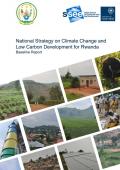This book draws on work from across several parts of the OECD and explores policy actions for the deployment of new technologies and innovations as they emerge: investment in research and development, support for commercialisation, strengthening markets and fostering technology diffusion. Competition will be essential to bring out the best solutions.
Key findings include:

This report focuses on the risks of climate change to development in Sub-Saharan Africa, South East Asia and South Asia. Building on the 2012 report, Turn Down the Heat: Why a 4°C Warmer World Must be Avoided, this new scientific analysis examines the likely impacts of present day, 2°C and 4°C warming on agricultural production, water resources, and coastal vulnerability for affected populations. It finds many significant climate and development impacts are already being felt in some regions, and in some cases multiple threats of increasing extreme heat waves, sea level rise, more severe storms, droughts and floods are expected to have further severe negative implications for the poorest. Climate related extreme events could push households below the poverty trap threshold. High temperature extremes appear likely to affect yields of rice, wheat, maize and other important crops, adversely affecting food security. Promoting economic growth and the eradication of poverty and inequality will thus be an increasingly challenging task under future climate change.
This paper explores the value of green growth from the perspective of sustainable development practitioners. First, it provides a brief definition of green growth, and why the concept is relevant for meeting Africa’s challenges. It then discusses how green growth can be achieved, highlighting some of the primary tools for achieving it, and then discussing focal areas that we believe will have the greatest impacts by spurring growth sustainably. Finally, it discusses how the AfDB has promoted green growth through its own initiatives. Boxes throughout the paper provide examples of the AfDB’s promotion of green growth in its project portfolio.


This Baseline Report is the first step in the process of developing a National Strategy on Climate Change and Low Carbon Development for Rwanda. It provides a snapshot of the country today and the planned initiatives that will take it forward, placing it within the context of climate change. Though many opportunities are highlighted, the aim of the report is to provide the foundation for the next step where detailed analysis will take place and recommendations will be made. It includes an analysis of the following sectors: climate policy; economy, trade and industry; energy; mining; transport; cities and the built environment; agriculture; land; water and forestry.
This summary was prepared by Eldis.
